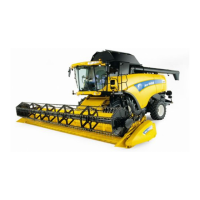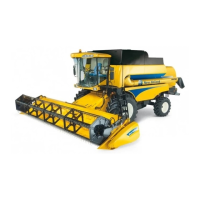Do you have a question about the New Holland CX880 and is the answer not in the manual?
Safety precautions for operating the combine, including slope limits and passenger restrictions.
Step-by-step procedure for safely starting the combine engine.
Guidelines and regulations for safely operating the combine on public roads.
Safe procedures for operating the combine, including safety guards and electrical hazards.
Safety instructions for coupling, detaching, and operating machine attachments.
Procedure for safely parking the combine, including lowering the attachment and engine shutdown.
Safety precautions to follow during machine maintenance procedures.
Specific safety instructions related to the engine, including cooling system and hot oil.
Guidelines for safe handling and use of diesel fuel, including prohibited practices.
Precautions for handling batteries due to sulfuric acid and explosive gases.
Information on maintaining safe stability and tracking characteristics, including brake force limiting valve.
Hydraulic safety requirements according to European Standard EN 982.
Explanation of safety decals placed on the machine for operator and bystander safety.
Overview of cab controls, including emergency exit procedures.
Description of steering column controls, horn, lights selectors, and brake pedals.
Detailed explanation of controls on the right-hand module, including MFH and header switches.
Instructions on operating the MFH for ground speed control and warnings.
Description of the InfoView monitor, its layout, and control interface.
Procedure for adjusting the sensitivity of straw walker and sieve loss sensors.
Details on the harvest info screen parameters: Farm, Field, Load, and Crop type.
Steps for setting up crop calibration, including inputting actual load weight.
Procedure for performing crop calibration, noting conditions and successful completion messages.
Instructions for installing and using the data logger with a data card.
Explanation of the ACS system, its modes, and factory default settings.
Procedure to save ACS user settings for current crop and mode, or for different crops/modes.
Menu for configuring machine settings and performing calibrations.
Adjusting display settings such as LCD contrast, brightness, speaker volume, and language.
Overview of calibration procedures for various machine systems.
Automatic process to calibrate the header position, requiring specific conditions.
Procedure to calibrate tyre radius for ground speed, involving driving between beacons.
Procedure to calibrate the multifunction handle by moving it through its range.
Procedure to calibrate concave position for accurate read-out on InfoView monitor.
Procedure to calibrate the upper sieve opening, involving closing and opening movements.
Procedure to calibrate the lower sieve opening, involving closing and opening movements.
Procedure for self-levelling cleaning shoe calibration, involving engaging threshing and setting engine idle.
Procedure to calibrate spreader plates to the center position using the rocker switch.
Procedure to set maximum stubble height for area counter start/stop.
Procedure to calibrate ground speed hydrostatic, involving handle movement and engine RPM.
Procedure to calibrate zero returns volume, requiring engaging threshing and high engine idle.
Calibration procedures for SmartSteer system components like HGS turntable actuator.
Procedure to calibrate the HGS Turntable actuator for proper operation.
Calibrating the rear axle steering cylinder sensor to its '0' driving straight forward position.
Adjusting SmartSteer sensor to detect crop edges automatically during harvesting.
Procedure to calibrate the HGS Turntable sensor for crop edge detection.
Items related to header configuration, dependent on the attached header type.
Setting precision farming parameters like Crop, Flow sensor type, and Data logger type.
Troubleshooting routines for tracing problems in the electric/electronic system.
Accessing service information including active alarms, errors, and error history.
List of active alarms with explanations and potential pop-up screen details.
List of active errors providing error ID, description, and fault code.
List of errors occurred since last clear, with options for sorting and erasing history.
Explanation of audible alarms (buzzer) linked to different alarm levels.
Conditions under which the engine automatically shuts off to prevent damage or ensure safety.
Pre-operation checks including manual reading, chain/belt tensions, pressures, and fluid levels.
Safe procedures for starting the engine, including daily start-up checks and warnings.
Procedure for safely stopping the combine engine.
Safe procedures for driving the combine, including gear selection and hazard warnings.
Operation of the parking brake, including its positions and automatic activation.
Procedure for using the quick stop button for emergency stopping of the combine.
Description of the gear selector switch and manual gear selection procedure.
Description of the combine harvester's five basic functions: Feeding, Threshing, Separation, Cleaning, Storage/Unloading.
Table detailing drum speed and concave position settings for various crop types.
Procedure for performing a 'kill-stall' to accurately check combine performance.
Explanation of four indicators that help assess combine performance: Grain tank sample, distribution, returns, and losses.
Classification of losses (pre-combining, header, leakage, shoe, fan, straw walker) and calculation methods.
Method for estimating crop loss level by measuring harvested surface area and grain weight.
Procedures for attaching the header to the combine.
Step-by-step instructions for connecting the header to the combine, including drive couplings.
Procedure for safely detaching the grain header from the combine.
Instructions for performing header settings and calibrations for automatic height control modes.
Operating the header in stubble height mode or Autofloat mode with sensors.
Using compensation mode for harvesting peas or laid crops with preselected pressure.
Automatic system to protect header skid shoes by reversing the combine.
Information on the automatic reel to ground speed synchronization system.
Instructions for adjusting the straw elevator bottom shaft.
Adjusting spring tension for the straw elevator bottom shaft based on crop.
System to reverse header reel, auger, and straw elevator to clear blockages.
Detailed steps for removing and installing the straw elevator, noting its weight and tractor requirements.
Instructions for cleaning the stone trap, including safety precautions.
Parameters for selecting drum speed and concave clearance based on crop conditions.
Procedure for removing and replacing the drum concave.
Information on the cleaning shoe, including speed adjustments and types.
Adjusting sieve openings for different grain sizes and conditions.
Adjusting upper and lower sieve openings, including rear part extension and cross-section.
Information on the cleaning fan, including speed adjustments and checking air volume.
Procedures for cleaning grain tank filling system components like cross auger and elevator.
Information on lower and upper grain tank level sensors and their warning indicators.
Important points for sensor functionality: sensor plate cleanliness and adjustment.
Procedure for chopping cereals, including drive belt installation and counter knife adjustment.
Procedure for chopping maize, including drive belt installation and shred bar adjustment.
Information on chopper rotor knives, including replacement and installation procedures.
Overview of combine lubrication and maintenance requirements for optimal machine life.
Procedure for greasing machine points, noting special notations and excess grease removal.
Procedures for checking engine oil level, and oil and filter change intervals.
Procedures for checking coolant level, coolant change, and coolant system capacity.
Procedure for filling the fuel tank safely, including cleaning filler cap and avoiding condensation.
Procedure for draining water and changing the fuel prefilter/water separator.
Procedure to bleed the fuel system for CNH engines.
Procedure to bleed the fuel system for Iveco engines, including air escape checks.
Procedure for cleaning the air filter element, including precautions for compressed air use.
Schedule of service tasks to be performed before first start-off, during run-in, and daily.
List of service tasks to be performed at 600-hour intervals or annually.
Instructions for checking and adjusting drive belts and chain drives.
Information on brake fluid level, fluid change, capacity, and fluid specification.
Safety information regarding hydraulic hoses, pressure, and fluid injection hazards.
Procedure to check and adjust toe-in for steering wheels to prevent premature tyre wear.
Overview of fuses and relays, including precautions for replacement.
Troubleshooting for concerns related to irregular feeding into the straw elevator.
Troubleshooting for concerns like excessive cracked grain, grain loss over straw walkers, and improper cleaning.
Troubleshooting for engine issues like failure to start, low power, overheating, and stalling.
Troubleshooting for issues related to the straw chopper, such as vibration, poor chop quality, and blockage.
Procedure for manually releasing the hydraulic parking brake if electrical release fails.
Steps to ensure the combine is kept in good condition for the next season after end-of-season use.
Steps to ensure the machine is in good condition and ready for use at the beginning of each season.
Accessories for straw handling, including chaff blower and chaff spreader.
Installation of chaff blower to spread chaff evenly, in combination with straw chopper.
Torque specifications for traction and steering wheel nuts.
Procedure to check and adjust toe-in for steering wheels to prevent premature tyre wear.
Checklist for customer required adjustments and services within the first 50 hours.
Checklist for dealer required adjustments and services within the first 50 hours.
| Type | Combine Harvester |
|---|---|
| Unloading Rate | 100 l/sec |
| Number of Straw Walkers | 6 |
| Transmission | Hydrostatic |
| Hydraulic System Flow | 120 L/min |
| Grain Tank Capacity | 10500 L |
| Tire Options | Varies |
| Number of Gears | Varies |
| Weight | Varies |
| Cab | Deluxe cab with air conditioning |











